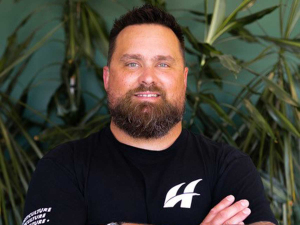“Put your head down, put your bum up, don’t ask too many questions, buy a house, and take a holiday once a year.”
A few decades on his Marlborough labour company employs 110 full-time staff across three provinces, a couple of hundred travellers and Kiwis, and 1,200 Recognised Seasonal Employee (RSE) scheme workers. “I don’t want to think about it too often because it makes me feel sick,” Aaron says. “There’s a lot of responsibility, when you think about the number of people who depend on the income from working for Hortus, particularly in the RSE scheme.”
He’s chuffed by the recently released Hortus Impact Report, which illustrates the power of RSE earnings in the home nations of workers, including businesses started, houses built and land purchased. But it’s a success he puts down to the workers at one end of the equation and the vineyard operators at the other, calling Hortus a conduit between the two. “Quite simply we don’t have a business without them and the impact is ours to share.”
Getting Down To Business
Aaron moved to New Zealand in 2001 when he was 21, three years after his British father and Kiwi mother came over with his two younger brothers. “Life dealt us a certain hand and it required me to come over a bit later on,” he says. He’d left school at 16 then done an array of jobs, including in insurance, banking, and data analytics. They meant little to him at the time but in retrospect proved valuable apprenticeships, “for lack of a better term”.
When he arrived in New Zealand Aaron began working in vineyards, trying everything from piece rate work to driving tractors. When his wife Renee, also a vineyard worker, was pregnant with their first daughter they decided they needed a new plan, and in 2008 launched Marlborough Vine Works with seven RSE workers, half a dozen Kiwis, and a van. They also had an ethos of respect, with the couple adamant from the very beginning that they would never ask anyone to live in accommodation they wouldn’t live in, or do work that they wouldn’t expect to do. They’re values that were supported by “a really awesome client base”, Aaron says. “The first set of advisors we had were our clients… They saw something in us and became our biggest advocates.”
His years in Marlborough vineyard work had exposed Aaron to the reality of “rogue” contractors at play back then. “I wanted to try and provide a much more professional service and a peace of mind service, so the growers employing us knew we were doing right by our people,” he says. “Having worked in the industry, and with people who didn’t look after their employees, I knew what not to do; I just had to work out what to do.”
The learnings from Aaron’s previous jobs – from desktop to vineyard – proved valuable along the way, with a grasp on everything from insurance and mortgages to the ramifications of the official cash rate. But the first years of business were tough, with late payments from clients putting the family house at risk, and Aaron working 80-hour weeks trying to keep their head above water.
He eventually followed the advice of his bank at the time, BNZ, and attended an Icehouse owner management course, dramatically changing the fortunes of his company, including its rebranding to Hortus in 2013, repositioned as a labour company specialising in viticulture. “We learned a massive amount which changed the shape of the business,” Aaron says. In the 14 years since he began with Icehouse, the company has achieved 29% growth year-on-year, and has expanded to Hawke’s Bay and Bay of Plenty.
The Icehouse Impact
Aaron hit the ground running with Icehouse, “like a sponge, taking in everything I could”. The programme developed his understanding of branding, marketing, goalsetting and leadership, as well as the importance of finding the right people to grow Hortus alongside him. “That’s one of the biggest things I took away – confidence in my decision making and closing the gaps by bringing in the right people to support me. Now we have a really strong team.” It’s meant constant reinvestment to allow Hortus to move to “the next rung on the ladder”, he adds. “We’re constantly investing in the future.”
As well as learnings, Icehouse gave him a “powerful” network, working with people from diverse backgrounds – from meat works and stainless-steel fabrication companies to mammoth multinationals – bringing a valuable cross section of perspectives. The group has met every year for the past 11 years, and check in frequently, so that once “complete strangers” now understand a great deal about his business and family. “It made me realise how important it was to have people who have your back,” he says. “It’s really lonely being an employer and sole owner operator. Sometimes you wonder how to navigate that. Having people from Icehouse in the same position, you can lean on them and use them as a sounding board… The network and insights you can get from these people is extremely powerful.”
Aaron was inspired to build a similar culture of support within the business, “and now we have a really awesome alumni outside Hortus, but we have an incredible one inside Hortus as well.” Aaron has put 10 of his staff through the Icehouse programme, to ensure the team is aligned and high performing, with a common view of the “personality” of Hortus and its place in the wine industry. “We are using the same terminology about the direction of the business.”
New Zealand’s wine industry is growing in scale and maturity, with its people, technology and aspirations in constant evolution, Aaron says. “It’s an awesome industry to be involved in and one we should be extremely proud of.” He’s equally proud of the RSE scheme, initiated in 2007, believing it to be a win-win for the wine industry and the seasonal workers it employs. According to the Hortus Impact Statement, the more than $NZ25 million in RSE earnings last year, after deductions, impacted 24,020 family and friends in the workers’ home nations, with 67 businesses launched as a result of the income, along with 69 land purchases and 257 houses built. Those life-changing opportunities mean a lot, says Aaron, echoing the values espoused by Sam Stubbs of the Simplicity KiwiSaver fund, who talks of the intersection of money, choice, and dignity. “If you have access to money then you have choice, and if you have choice, you have dignity,” Aaron says. “My goal is to try and create that for as many people as possible.”
Hortus Impact Report
The Hortus Impact Statement from 2023 reports that 1,200 Recognised Seasonal Employee Scheme employees, working in New Zealand for between two and seven months, earned a combined $NZ25 million in take home pay between January and December 2023, which impacted 24,020 family and friends in their home nations. The information, gleaned from company data, survey results from workers, and personal storytelling, reveals that 67 employees used their 2023 Hortus earnings to start a business, 69 bought land, and 257 built a house, while the income also paid for 2,100 children to go through schooling. Hortus founder Aaron Jay says the figures embody what Hortus calls its MAP values: Making a Difference, All Together Better, Proud of What We Do. And they are testament to the work of the people the work for, he says. “These are not our numbers; they are our clients’ numbers.”
The Icehouse
Small and medium businesses are the “engine room” of New Zealand’s economy, says The Icehouse chief executive Olivia Blaylock. As a registered charity, The Icehouse is an advocate for the midsize business industry in Aotearoa, she says. “For 23 years, The Icehouse has listened to and mentored 4,000 Kiwi business leaders to achieve an average post-programme growth of 250% within their businesses. As the business landscape is in an important period of change, the entire Icehouse team is focused on delivering up-to-the- minute nationwide support of owner managers.”
Icehouse alumni have achieved an 11.03% average annual compounding growth rate, compared to a 6.35% average for small to medium businesses, and a 15.61% increase in operating profit, compared to 6.%. A recent SME Impact Report, containing data from more than 900 unique businesses between 2017 and 2023, reveals that 77% of the programme alumni reported an improvement on financial performance, and 83% reported an impact on personal wellbeing.














